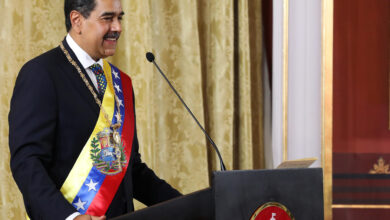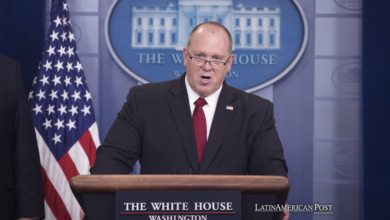With China's mediation, the Saudis and Iranians reached an agreement to restore their diplomatic relations, which have been broken since 2016. How far will this agreement between Iran and Saudi Arabia go?.

Photo: dpa
LatinAmerican Post | Luis Angel Hernández Liborio
Listen to this article
Leer en español: Irán y Arabia Saudí restablecen relaciones: ¿fin del terrorismo en la región?
Two countries with political, social and religious rivalries of centuries have managed to reach an agreement to restore their diplomatic relations. Saudi Arabia and Iran will reopen their respective embassies and with this they will give a new opportunity to the relationship broken since 2016. Security in the region is one of the most relevant issues, the scope of the reestablishment of relations is one of the unknowns, will it be enough to achieve a lasting peace?
Peace Between Sunnis and Shiites on the Horizon?
The Middle East is a diverse region that has in common the colonial past and the deep religious roots linked to Islam. The great division within Islam, between Sunnis and Shiites, is summed up in the rivalry between Saudi Arabia and Iran, radical defenders of each of the religion's positions. On the one hand, there are the Sunnis, who consider that they have followed the direct and conservative line of the teachings of Muhammad, and, on the other, the Shiites, who defend the line inherited by the son-in-law of the prophet. Thus, the Sunnis, led by Saudi Arabia, and the Shiites, led by Iran, have been protagonists of not only theological confrontations, but have also gone on to the field of violence.
The large terrorist groups in the region fall under one of the two currents, so that between both countries and their allies there has been mutual suspicion of espionage, financing of armed groups, support for social outbursts and attacks. The current rapprochement between Arabia and Iran attends to a strategic issue rather than conciliation between Sunnis and Shiites, so the religious problem that motivates terrorist groups will continue to be in the pipeline. The rapprochement between the two States could even radicalize groups that absolutely reject any relationship with their enemies. The fragility of relations between Saudi Arabia and Iran could easily cause a new rupture, the underlying (religious) issues remain latent.
Is the Middle East Reconfigured?
The region is in an era of definitions. On the one hand, at the economic level, the Islamic countries that depend on energy resources seek to diversify their economies to depend less on them and, above all, thinking of a post-oil era. The stabilization of relations between Saudi Arabia and Iran could create harmony, or at least reduce tensions, between the countries of the region. The economic benefit could be felt in areas such as tourism and vital investments to expand its economic possibilities.
At the geopolitical level, the reestablishment of relations will allow a more discreet and careful management of the issues on the regional and global agenda. It could push for a better relationship between Iran and the United States through Saudi mediation. The main problems of the Middle East could be dealt with directly between the two regional powers, although making it clear that there are issues up to now that are irreconcilable and that divide them, such as the case of Syria or the relationship with Israel.
You can also read: Earthquakes in Turkey and Syria: What comes After the Rescue and How can the World Help?
Israel in the Equation
Israel is a taboo subject between the Arab countries and Iran, the Palestinian struggle continues to weigh on any attempt to even raise the status of the Jewish state before them. Reiterating the interest of countries like Arabia and the United Arab Emirates to diversify their economy, they cannot ignore the weight of Israel in this area. Timidly, these countries have begun to thaw their relations with Israel, they are not yet at the highest level, but the path seems to be towards normalization. By contrast, Iran and Qatar still resist engaging with the Jewish state. This complicated network of alliances and enmities is the main complication in the region's diplomacy.
While Saudi is an ally of the United States, it maintains a strategic relationship with Russia and has just restarted the one it has with Iran. The Iranians have a tense relationship with the United States, but a close one with Russia. For Iranians and Saudis, the relationship with Israel still has an uncertain status, despite US mediation. The delicate balance with which each country must take each step is what breaks with any projection. The war in Ukraine is a clear example of this dangerous dance between such complicated actors. The way in which Russia, Iran, Arabia, the United States and Israel have made their moves in the Middle East is worthy of chess or a puzzle.
The Chinese Factor
If the scenario is already complicated, there are two actors left to consider. On the one hand, the European Union, a strategic ally of Israel and Saudi Arabia, and on the other, China. The Asians have shown their power by bringing the Arabs and Iranians to the table (with the help of Iraq and Oman) to reach a historic agreement. The US influence on Iran and Israel seemed to be the most important in the region, however, it was the Chinese who have taken a crucial step.
In the middle of the fight for global leadership, the Asian giant has shown the United States its capacity in diplomacy by showing authority, one that the North American country seems to lose. If Israeli relations with Arab countries were to normalize in the coming years, US influence would be seriously reduced, while China could provide the long-awaited investments that the Middle East awaits.




